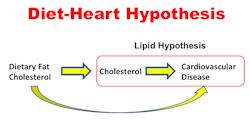

Ancel Keys - Physiologist

Famous during WWII. Based on epidemiology statistics he guessed that saturated fat clogged the arteries and caused heart disease. That is the Diet – Heart hypothesis.
Ancel Keys was very articulate, and his theory, that diet (saturated fat in particular) caused heart disease, seemed to make sense, and in a short time it was widely accepted.
The suggestion that it was high cholesterol that caused heart disease came from a different source.
For years we've been trying to eat a low-fat high-carbohydrate diet, based on Ancel Key's idea that saturated fats, caused high cholesterol which in turn caused heart disease. We now KNOW that this theory is wrong.
We were also discouraged for eating eggs, because eggs were supposed to be our chief source of dietary cholesterol. Cholesterol at the time was thought to be harmful to our arteries and a risk factor for future heart disease.

Sadly, these two ideas led to the misdirection of human dietary research for the next 40 years. There was no controlled scientific testing to prove either hypothesis.
Dietary control of cholesterol is a failure because your body creates it's own cholesterol.
It's now believed that atherosclerosis is caused by inflammation, and that the cholesterol in those vascular plaques are part of the body's attempt to repair that damage.
The Cholesterol Issue
1961: Total Cholesterol is a good marker of future cardiovascular disease. But 20 years later that finding was reversed.
The Framingham Heart Research Study finally showed that total cholesterol was not a good marker for future risk of atherosclerosis.
1988: Higher HDL-Cholesterol reduces the risk of death, and "low Total Cholesterol is linked to more cancer, and poor circulation."
Framingham suggested that HDL-Cholesterol was protective, and that LDL-Cholesterol might or might not be harmful. Hence, the idea of good cholesterol and bad cholesterol, became popular. If LDL-Cholesterol is "bad," it's suggested that the small dense particles cause the problem.
Cholesterol is required for the building of cell walls and nerves. High cholesterol levels in the arteries of heart disease patients, may not be a cause of disease, that may in fact be the bodies attempt to repair those arteries.
The highest levels of cholesterol are in the brain, and a shortage of cholesterol there is associated with dysfunction.